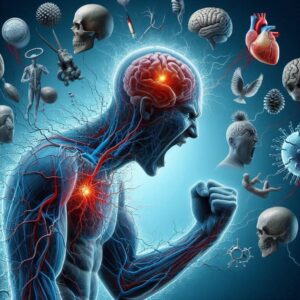Transform Your Anger into Positive Change with Effective Therapy Techniques
Anger is a natural and essential emotion that every individual experiences at different points in their lives. This intense feeling can arise from various circumstances, including being threatened, feeling personally attacked, experiencing frustration, or dealing with feelings of betrayal, harm, or insult. Understanding the complex nature of anger is vital for personal development and emotional self-regulation. By recognizing the origins and triggers of this powerful emotion, individuals can embark on a transformative journey toward healthier emotional responses and enhanced mental well-being, fostering resilience and emotional strength.
It is crucial to understand that experiencing anger is not inherently negative; what matters most is how we channel and manage this emotion. The diverse expressions of anger—ranging from mild irritation and annoyance to deep resentment and explosive rage—can significantly impact our relationships and overall quality of life. By developing a keen awareness of these various expressions, individuals can navigate their emotional experiences more effectively, leading to healthier and more constructive interactions with others, ultimately improving their social dynamics.
Physical signs of anger can manifest in various ways, including a racing heartbeat, heightened blood pressure, and increased muscle tension. If left unaddressed, these symptoms can escalate into harmful behaviors that jeopardize relationships, career opportunities, and overall life satisfaction. Recognizing the signs of anger and understanding its root causes are essential steps toward effectively managing this potent emotion, ensuring it does not dominate one’s life and lead to destructive outcomes.
The triggers for anger can stem from numerous sources, including external events, internal thoughts and feelings, and physiological responses. By exploring these triggers, individuals can gain valuable insights into their anger, facilitating the development of robust coping mechanisms. This deep dive into one’s emotions can significantly enhance personal growth and emotional intelligence, empowering individuals to proactively and constructively manage their feelings in challenging situations, ultimately promoting a healthier emotional landscape.
Key Strategies for Mastering Effective Anger Management Techniques
- Acknowledge that anger is a natural response that can become problematic without effective management strategies.
- Unchecked anger can lead to critical mental and physical health consequences.
- Participating in anger management therapy provides individuals with essential tools for expressing anger in a constructive manner.
- Therapeutic approaches introduce valuable techniques such as deep breathing and enhanced communication skills to address emotional hurdles.
- Therapy aids in identifying personal triggers and the deeper issues that drive feelings of anger.
 Exploring the Severe Consequences of Uncontrolled Anger on Your Overall Health
Exploring the Severe Consequences of Uncontrolled Anger on Your Overall Health
Examining the Physical Health Risks Linked to Chronic Anger
Extensive studies have demonstrated a significant correlation between chronic anger and serious health issues. These complications may include elevated blood pressure, cardiovascular problems, and a compromised immune system, all of which can increase the risk of strokes and other serious health emergencies. Additionally, persistent anger can lead to debilitating conditions such as irritable bowel syndrome, insomnia, and tension headaches, all of which can severely disrupt daily life and overall health, making it imperative to address anger effectively.
The Ripple Effect of Uncontrolled Anger on Mental Health and Personal Relationships
The repercussions of unmanaged anger extend far beyond physical health, creating substantial challenges for mental well-being. Ongoing feelings of anger can serve as a precursor to anxiety disorders, depression, and substance abuse issues. Furthermore, uncontrolled anger can strain personal relationships, often leading to conflicts and emotional detachment from loved ones, perpetuating a cycle of isolation and emotional turmoil that can be difficult to break free from.
Recognizing the Necessity for Support: The Importance of Developing Anger Management Skills
Understanding the detrimental effects of uncontrolled anger on both mental and physical health underscores the importance of seeking help and learning effective anger management strategies. Individuals must confront the reality that unchecked anger can threaten their overall well-being. By acknowledging the long-term consequences of persistent anger, individuals may feel inspired to actively pursue constructive strategies and support systems that encourage healthy emotional expression and management, leading to improved quality of life.
Unlock the Transformative Benefits of Anger Management Therapy
Engaging in anger management therapy offers a multitude of benefits for individuals struggling with overwhelming anger. A primary advantage is the opportunity to delve into the root causes of anger while acquiring practical coping strategies. During therapy sessions, participants can explore what triggers their anger, fostering a deeper understanding of their emotional responses and reactions, which is essential for personal growth and emotional healing.
This heightened self-awareness is crucial for developing effective anger management techniques. Therapy provides a safe and supportive environment where individuals can reflect on their emotions and learn healthier ways to express and cope with anger. Clients gain insights into their emotional states and also develop essential communication skills that can enhance their relationships and reduce conflict. By empowering individuals to take charge of their emotions, anger management therapy can pave the way for a more balanced and fulfilling life.
Moreover, anger management therapy plays a vital role in helping individuals break free from destructive behaviors often associated with uncontrolled anger. By interrupting harmful patterns, clients can regain control over their lives and cultivate healthier, more satisfying relationships. By implementing effective coping strategies and stress management techniques, individuals can reduce the detrimental effects of anger on their mental and physical health. Ultimately, the profound benefits of anger management therapy can lead to lasting, positive changes in an individual’s life.
 Diverse Techniques and Strategies Offered in Anger Management Therapy
Diverse Techniques and Strategies Offered in Anger Management Therapy
Anger management therapy equips clients with a wide array of effective techniques and strategies for managing their anger constructively. One commonly employed method is deep breathing exercises, which help individuals regulate their physiological responses to anger while simultaneously reducing stress and tension. Mindfulness meditation is another powerful technique introduced in therapy, encouraging individuals to focus on the present moment and enhance their awareness of their thoughts and emotions, promoting tranquility.
Cognitive restructuring is a fundamental component of anger management therapy. This approach involves identifying and challenging negative thought patterns, replacing them with more rational and balanced perspectives. By reframing their perceptions of triggering situations, individuals can learn to respond to anger more constructively. Additionally, therapy often includes problem-solving skills to assist clients in effectively addressing the root causes of their anger, fostering a proactive approach to emotional regulation.
Furthermore, assertiveness training is frequently integrated into anger management therapy, empowering individuals to express their needs and establish healthy boundaries respectfully. Those who master these techniques and strategies in therapy can cultivate a versatile toolkit for managing their anger across various contexts, enhancing their adaptability and emotional resilience, ultimately leading to healthier interpersonal dynamics.
Delving Deeper: Understanding Triggers and Roots of Anger Through Therapeutic Exploration
Therapeutic sessions provide individuals with the opportunity to explore specific triggers and underlying issues contributing to their anger. By reflecting on various situations, thoughts, and emotions, clients can uncover valuable insights into what ignites their anger. Recognizing these triggers enables individuals to identify early warning signs before they escalate into uncontrollable outbursts, promoting proactive anger management.
Therapy serves as an invaluable resource for those seeking to pinpoint their anger triggers and address the core issues that fuel these feelings. This process may involve examining past experiences, traumas, or learned behaviors that shape one’s emotional responses. Effectively confronting these underlying factors can lead to significant breakthroughs in healing emotional wounds, ultimately fostering a sense of peace and emotional balance.
In a therapeutic environment, individuals are provided with a safe space to explore their triggers and underlying concerns without fear of judgment or criticism. This journey of self-exploration can be empowering, equipping clients with the tools necessary for managing and channeling their anger in healthy and constructive ways, promoting personal growth and emotional stability.
The Vital Role of Cognitive Behavioral Therapy in Successful Anger Management
Confronting and Correcting Irrational Beliefs to Cultivate Rational Thinking
Cognitive Behavioral Therapy (CBT) focuses on confronting irrational beliefs and replacing them with logical, balanced thought processes. By identifying and addressing these cognitive distortions, individuals can foster a more constructive and realistic perspective on situations that trigger their anger, leading to healthier emotional responses and improved coping mechanisms.
Gaining Practical Coping Strategies for Daily Anger Management
Beyond recognizing cognitive distortions, CBT empowers individuals with practical coping strategies for managing anger effectively. Techniques such as relaxation exercises, assertiveness training, and problem-solving skills are essential for addressing the root causes of anger. These strategies equip individuals with actionable tools that can be utilized in everyday situations to help regulate and manage their emotional responses, promoting emotional health.
Enhancing Self-Awareness for Better Emotional Regulation
Furthermore, CBT enhances self-awareness by helping individuals understand the connections between their thoughts, emotions, and behaviors. By gaining clarity on these relationships, individuals are better equipped to manage their emotional reactions to anger-triggering situations. Mastering effective anger management is crucial for fostering emotional regulation and overall well-being. Cognitive Behavioral Therapy plays a significant role in this process, equipping individuals with the skills necessary to navigate their anger and improve their quality of life.
 Ensuring Ongoing Success: Continued Support and Resources After Therapy
Ensuring Ongoing Success: Continued Support and Resources After Therapy
For individuals who have completed anger management therapy, it is essential to continue seeking support and utilizing resources to maintain their personal growth. To further enhance their anger management skills, individuals might consider joining support groups or engaging in one-on-one counseling sessions. Support groups offer a valuable opportunity to connect with others facing similar challenges, fostering a sense of community and empathy. These groups create an environment for sharing experiences and learning from one another, helping to alleviate feelings of isolation and promote a sense of belonging.
In addition to ongoing support, individuals can explore various resources, including self-help books, online platforms, and mobile applications designed to assist in effective anger management. These tools offer additional strategies and methods for practicing healthy coping mechanisms outside of therapy sessions. Furthermore, maintaining progress post-therapy may require lifestyle adjustments that promote overall well-being, such as regular exercise, balanced nutrition, adequate sleep, and stress-reduction practices.
Incorporating these lifestyle changes into daily routines can significantly reduce the likelihood of experiencing overwhelming anger. Understanding and effectively managing the powerful emotion of anger is crucial for maintaining personal control. The consequences of uncontrolled anger can severely impact both mental and physical health, underscoring the necessity of seeking help through anger management therapy. This comprehensive understanding equips individuals with the knowledge they need to navigate their emotions effectively and promote healthier emotional expressions.
Therapy serves as a vital resource for individuals grappling with the complexities of uncontrolled anger. It empowers them to comprehend their emotional triggers, confront underlying issues, and acquire practical strategies while providing the necessary support for sustained progress. By equipping individuals with the knowledge and tools to manage their anger, therapy fosters healthier coping mechanisms and enhances overall emotional well-being.
Presented By:
References
- Teen Addiction Treatment Ames Iowa | Ember Recovery. https://emberrecovery.org/teen-addiction-treatment-in-iowa/
- Why Men Should Not Cover Up Their Emotional Distress | TheBeardMag. https://www.thebeardmag.com/lifestyle/health/why-men-should-not-cover-up-their-emotional-distress/
The Article: Interventions for Anger Management appeared first on Anger Management Leyland.
The Article Managing Anger: Proven Strategies for Success appeared first on https://mcrtherapies.com
The Article Proven Strategies for Success in Managing Anger Was Found On https://limitsofstrategy.com
Comments
2 responses to “Managing Anger: Proven Strategies for Success”
Your insights into the nature of anger resonate deeply with me. I’ve found that acknowledging my anger has been a crucial step in my personal growth journey. For instance, I began journaling about my feelings, which not only helped me identify my triggers but also allowed me to express my emotions in a constructive way.
It’s really encouraging to hear about your experience with acknowledging anger as part of your personal growth journey. Journaling is such a powerful tool; it creates a space where you can be completely honest with yourself, away from the noise of daily life. Writing can often feel like a dialogue with our inner selves. In your case, it sounds like you’ve turned that dialogue into a form of self-discovery.